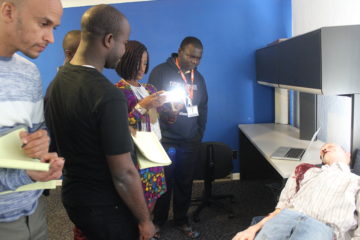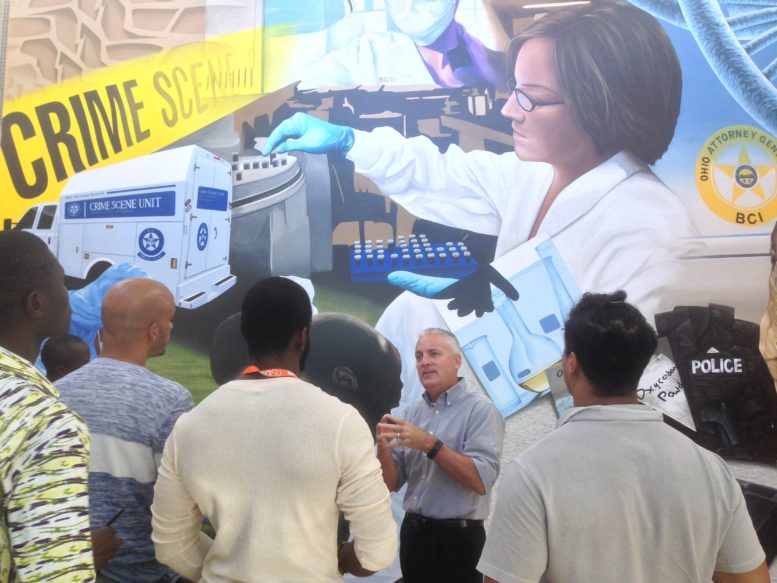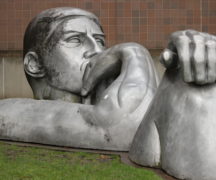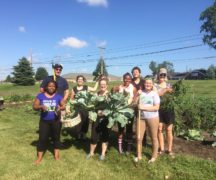By DAVID DUPONT
BG Independent News
The future of Africa is at Bowling Green State University.
The university is hosting 25 organizers and activists as part of the Mandela Washington Fellowship for Young African Leaders. The institute hosts 1,000 fellows at institutions across the country. (http://bgindependentmedia.org/bgsu-hosting-young-african-leaders/)
A conversation with nine of fellows included men and women from Mauritania and Niger in the northern end of the continent to Zimbabwe near the southern tip. The issues they were concerned with were similarly broad, from helping those caught up in the sex industry, education, and environmentalism.

Mandela fellows study a crime scenario in the crime scene house at BGSU.
And they said they were finding ways of addressing those issues here in the Northwest Ohio meeting with civic leaders and during outings as close to home as the farmers market and as distant as Columbus and Detroit. Tuesday they toured the Bureau of Criminal Investigation lab and crime scene building.
Jon Sprague, the director of the Governor’s Center for the Future of Forensic Science at BGSU, also spoke about the opioid crisis.
Yet their greatest source of support and knowledge, they said, was each other.
“I think the best art of this program was my colleagues,” said Chibuzor Azuuike, of Nigeria. “Africa has to move forward .So meeting people who are of like-mind, who are very passionate about making an impact back at home, is important. I’ve learned a lot from them, and we hope to partner on projects.”
Loice Kapondo, of Zimbabwe, said in the week they’ve been at BGSU “we’ve been sharing stories formally and informally. … Their strategies are easy to adapt to my country because of the similarities.”
While Africa is not a homogeneous entity, the sub-Saharan countries do share much.
“I think in Africa there’s more that makes us similar than makes us different,” Azuuike said. “Africa is both one and many.”
The issues that the fellows are concerned about are many.
Aishatu Abubakar-Addullateef is a psychiatrist at a teaching hospital back in Niger. She volunteers to raise awareness of the psychological stresses children face and to train teachers to better deal with that in order “to improve the lives of children.”
Melainine Mouhoudis is interested in developing vocational training in Mauritania. Now the society considers only those who can go to a university – something that’s out of reach for most – can prosper.
This system, based on the French model, looks to keep Africans in a subservient position, he said.
In the United States, he said, advancement seems based more on what someone can do, more than their degree. He wants to bring that attitude back home with him.
The fellowship offers, Mouhoudis said, “young African leaders a good way for us to identify new strategies that will allow us to get this separation for Europe, and sit at a table and negotiate.… We have a lot of resources in Africa. We need to benefit from those resources.”
His views resonated with Kapondo. She works with girls and women in the sex industry. “I came here to learn about different ways to mobilize the women so maybe they can empower themselves.”
Part of that involves training them in job and life skills, and that intersects with Mouhoudis’ concerns. “I’m telling them you are unique,” she said “With education, you can be someone.”
She would like to build a camp on land she owns for them to give the psychological treatment and training they need to eventually reintegrate into their communities that isolated them because of their occupations.
Emily Miki, of Cameroon, works with a non-governmental agency that she founded and named for her father. The focus is on community development and the rights of women and girls.
She’s looking to make connections with other programs working on similar issues as well as to enlist American volunteers to come and work in Cameroon.
Women are central to the work of Vincent Odour Auka of Kenya. His mission focuses on the orphans created by HIV-AIDS and the grandmothers who end up raising them.
His organization builds houses for them – they now are so poor, he said, they live in grass thatched huts.
He knows first hand about the tragedy. The uncle he lived died from complications of AIDS, he said. And his 25-year-old sister died of the disease. Now he is raising her daughter.
His goal as a Mandela Fellow is to learn how better to manage a non-profit. The organization his uncle founded struggled under the new leadership.
“I came to US to learn about community engagement,” he said. He feels he can learn from those he’s interacted with here. “I can draw some new ideas so when I go home I can meet these things effectively.”
Auka found the session at BCI relevant. If the orphans are not cared for, they could very well begin abusing drugs.
Onyango Ojwang, who focuses on environmental issues in Kenya, was impressed with the visit for the Bowling Green Farmers Market. He was impressed with the quality of the produce, and more impressed that the farmers he met only farmed part-time.
Ojwang also noted as the group traveled to Detroit how well kept the highways are. Not just the conditions of the pavement but trees alongside the highway. The roadside was generally free of trash as well.
This he attributed to the greater emphasis on recycling.
Bula, of Angola, said that this is something Africans could emulate. The economy could benefit by making better use of waste materials.
Francis Osei Bonsu, of Ghana, said he was interested in how Americans worked together.
“American culture is having great influence back home,” he said. “People are becoming more self-centered and individualistic.” Still he’s seen here how people can pull together.
He is wary of transferring programs he’s experienced her “verbatim” back to Ghana.
That’s why his fellow Africans have provided knowledge more important than what they received in class because they understand the context.
“You have to understand your own values and modify what you learn here.”



